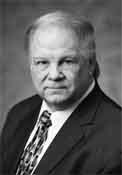 | John Eck
is the owner of the ECK Agency, Inc., which is an independent insurance agency representing over 80 companies offering life, health, property & casualty insurance. Beginning his career in 1968, he is a Certified Insurance Counselor, a licensed Kansas insurance broker, and has held numerous positions with other related business ventures. Currently an active member of his local School Board, he has also held elected positions on the City Council and Hospital Board in past years. John can be reached at his office by phone at (800) 444-4911, or you may e-mail him at: eck@eckagency.com |
Insurance
2005-10-01 14:59:00
The insurance man - series
ANSWER: It depends on whether or not you're in a first-party or third-party claim situation. In a first-party situation, when the claim is being paid by your insurer, the check will likely be made out to you and the body shop. In a third-party situation, when the claim is being paid by the other driver's insurer, it's likely that the check will be made payable to you alone. Who receives the claim-payment check often depends on who caused the accident. If you get into an accident and have collision insurance, your insurer will pay the repair bill after you've paid your deductible. This is known as a first-party claim situation. In first-party claims, your insurance company has the right to pay whomever it deems necessary to settle your loss, subject to state insurance regulations. For instance, if you own your car, your insurer might issue a check made out to you and the body shop you've chosen to repair your car. However, some states, such as Massachusetts, have instituted a "direct payment plan" under which the amount of the claim will be paid directly to you and you can then use those funds to pay for work done at the repair shop of your choice. In first-party claim situations, you can't object to the repair shop being named on the insurance check if you've agreed to those terms within your auto insurance policy. Also, you might never see a check from the insurance company if you choose to have your car fixed at one of the insurer's recommended or preferred repair shops. Insurers have special relationships with these repair facilities, which may allow for direct payment from the insurer to the repair shop. The approved repair shop often provides lifetime warranties on their repair.Car leases and loans can throw an extra wrinkle into the first-party claims-paying process because your insurer will likely issue a check made out to you and your leaseholder or lien holder. That means you have to go to the bank or, even worse, mail your check to the financial institution for its signature. There's no telling how long that can hold up the return of your fixed vehicle, but count on doing some extra legwork. When a lien holder's name is included on the check, it creates the burden of having the lien holder examine the vehicle in order to get the check endorsed. It can also take extra time to get the check endorsed. Typically, you have to bring the vehicle to a dealership and get it to sign a statement that the vehicle has been repaired. You then have to mail the repair shop's bill, pictures of your repaired vehicle, and the check to the lien holder or leaseholder. The bank or lender will then endorse the check, send it back, and you can pay for your repair. With third party claims (other party at fault), the other insurance company owes you a rental vehicle (of like quality) until your vehicle is repaired. If the decision is made to total the vehicle, no rental car is required to be provided once the offer is made. Generally it is better to have the vehicle repaired. Loss of value to the vehicle is usually not recognized as payable in Kansas regardless of fault. Note: In Kansas, the only type of accident that is 'No Fault' is if your vehicle is damaged while lawfully parked or if the other vehicle owner pays all damages to your vehicle.This process can be time-consuming, but it might not hold up your vehicle's repair; however, it might delay the delivery of your repaired vehicle to you. A body shop might repair your vehicle but it generally won't return your vehicle until it's gotten paid. If your car is totaled, the insurer again has the option of making the check out to you alone, or to you and your creditor. If someone else smashes into your car and his or her insurance company is paying for the repairs, you are a third-party claimant. This is typically less of a hassle than first-party claims because you have no obligation to that insurance company. The insurer can't dictate to whom it pays the money because it doesn't have a policy contract with you. In most third-party claims, insurers pay the claimant directly. If your vehicle has been totaled in a third-party claim situation, the at-fault party's insurance company will likely pay only you. Of course, if you have a lease or a loan, it's your responsibility to make sure your creditors get the money you owe them. Knowing the claims-paying process can help expedite your repair and cut down on surprises. And, if you have a car lease or loan and make a first-party claim, you might do well to make an appointment ahead of time with a dealership or your bank for the inspection of your fixed car. That way, you can put the accident behind you, give the body shop its money, and get your car back.


